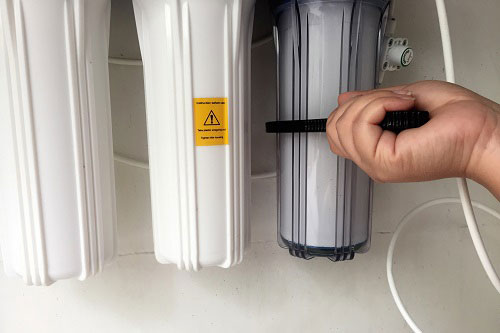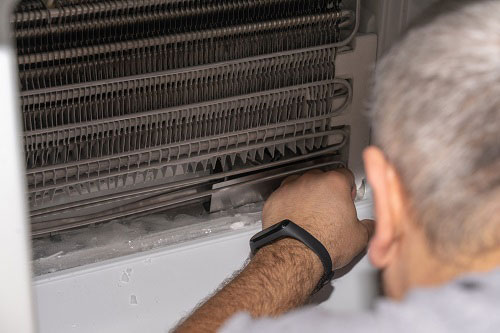Whether it's an ice machine, a fryer or a combi oven, commercial kitchen equipment must be clean to run at peak performance. While operators clean a unit daily or throughout the week, larger preventative maintenance focused on inspections, deep cleanings, and filtration is crucial. Authorized service agencies and technicians should always offer planned maintenance packages that include routine upkeep throughout the year. Below are tasks that service companies should consider offering customers.
1. Installing & Replacing Water Filters
Frequency: Quarterly or Bi-Annually

When installing commercial equipment that uses water, let your customers know about the importance of filtration. Filters remove sediments and particles from the water, which helps improve not only quality and taste but also the performance of the equipment. This extra measure also prevents parts from eroding faster, meaning the customer can avoid costly repairs on large components or replacing the entire machine.
There are multiple types of commercial water filters designed for different kitchen equipment. Water-based units, such as ice machines, beverage dispensers, coffee machines, and combi ovens, usually have filters that need to be replaced at least once every six months. However, in areas with hard water, the consistent lime and scale buildup can do a number on the unit. In these instances, you should offer to replace filters quarterly.
Finally, make sure your maintenance package uses OEM filters tailored to the exact piece of equipment. Why? OEM filters are designed and tested to the proper specification of the unit. This helps ensure that the equipment continues to operate properly and efficiently.
2. Deep Cleaning & Sanitizing
Frequency: Quarterly (More frequently depending on equipment use)
Operators can handle the daily and weekly cleaning of the equipment, but these machines require in-depth procedures throughout the year. Many manufacturers require deep cleaning and sanitization of internal parts and components. In most cases, operators might not have the time to conduct these full-scale cleanings, or they're not equipped to get deep inside the unit.
As a service company, you can offer a planned maintenance package that cures this headache for the customer. While each piece of equipment has different procedures, most require certain parts to be removed from the machine's interior. For example, on ovens, you typically remove the blower motor, hoses, fans and valves to be cleaned a few times a year. On ice machines, the ice thickness probe as well as bin and evaporator assemblies require cleaning and sanitizing at once a quarter. These components need to be cleaned carefully with OEM-approved, food-safe cleaning solutions and sanitizers.

Refrigeration equipment has a couple of maintenance tasks that require dedicated attention. In fact, an entire package could focus on cleaning the condenser coil. This procedure is typically done once every three months since food remnants and grease quickly build up on the coil. Cleaning the part and surrounding assembly helps maintain proper temperature in the unit and prevents overheating.
3. Tune-Ups and Checking Components
Frequency: Bi-annually or annually
Depending on the type of unit, consider offering a planned checkup. Due to lime and scale buildup, beverage equipment, ice machines and combi ovens would benefit from an inspection once every six months. As we mentioned in the section regarding water filtration, components that come in contact with water wear out faster than parts on units that don't use water. That means convection ovens, fryers and refrigeration units typically can undergo a checkup just once a year.
An inspection can include a quick check of parts that commonly experience wear with consistent use. For instance, you might check O-rings, valves, and spray heads on beverage equipment since they deal with water. On refrigerators, inspect the handles, gaskets, wiring and the evaporator assembly. If you see that other parts appear to be breaking down, you can notify the customer and recommend replacing them as soon as possible.
So why is this necessary? By doing these routine checks, you can help stop the unit from breaking. This not only helps customers avoid downtime in their kitchens, but it also can stave off more costly repairs down the road and leave your customers completely satisfied.
Content sponsored by Parts Town.



